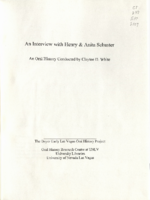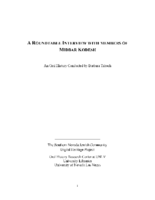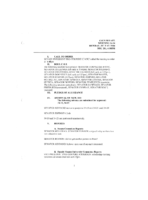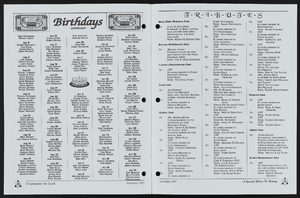Search the Special Collections and Archives Portal
Search Results

Transcript of interview with Ruth Urban by Barbara Tabach, August 24, 2015 and September 16, 2015
Date
Archival Collection
Description
In this interview, Urban discusses her upbringing in Las Vegas, and childhood friendships, many which came from within the Jewish community. She talks extensively about her professional career and passion for mediation as a strategy for problem-solving. In addition, Urban describes her community service commitments over the years, including her current role with Nevadans for the Common Good. Urban married Andrew Urban Jr. in 1983, and the couple have a son, Andrew Urban III.
Text

Transcript of interview with Henry and Anita Schuster by Claytee White, March-April 2011
Date
Archival Collection
Description
In this oral history, the long married couple Henry and Anita Schuster recall the history of the 1930s and how they eventually met and created a life together. Their childhoods were distinctively different, but charter a future where they would inevitably meet. Born in Germany in 1926, Henry recalls the dawn of Hitler and the Nazism. His mother would arrange for his evacuation to France, where he would not know her fate or that of his two sisters for a number of years. Along with hundreds of other displaced children, he escaped to America and lived with relatives in Louisiana where he finished his schooling and joined the US Army. Anita on the other hand grew up with her family in New York. They share the story of meeting when she was 16, falling in love and marrying in 1948. They had four children and moved several times before settling in California. They retired to Las Vegas in 1993. Henry's recollections include childhood memories of the Holocaust and its affect on his family, including the loss of his mother and one of his sisters. Finding his surviving sister Bertel (Betty Kale) after the war is a heartwarming tale of survival. The Schusters are part of the approximately 300 members of the Holocaust Survivor Group that has settled in southern Nevada and Henry was President Emeritus of the group. He published his memoir, Abraham's Son-the Making of an American, in 2010.
Text

Transcript of roundtable interview with members of Midbar Kodesh, April 19, 2015
Date
Archival Collection
Description
In this interview, members of Midbar Kodesh discuss how they each became involved in the synagogue, and how the congregation formed in the mid-1990s. Some of the narrators grew up in Las Vegas and talk about the growth of the town and being former members of Temple Beth Sholom.
Text

Transcript of interview with Bruce Isaacson by Barbara Tabach, March 24, 2017
Date
Archival Collection
Description
Bruce Isaacson was born in 1956 in Castro Valley, California to Betty Griffin and Bernard Isaacson, and spent his childhood in Oakland. He received his bachelor?s degree from Claremont McKenna College with majors in economics as well as drama, and continued studying for his Masters of Business Administration at Dartmouth College. After receiving his MBA, Isaacson started a career in finance, focusing on mergers and acquisitions. In 1995, he moved to Las Vegas to pursue a real estate career alongside his father. In June 2015, Isaacson became Clark Country?s first poet laureate to encourage poetry as an art form in Southern Nevada. Although Isaacson began writing poetry at a young age, he wanted to develop his craft further. So he attended Brooklyn College for a Masters of Fine Arts and studied with famed poet Allen Ginsberg. Isaacson is known in the San Francisco Bay Area as organizer and poet in the Cafe Babar readings in the 1980s. He is also a co-founder of Zeitgeist Press, where he remains publisher and co-editor. In this interview, Isaacson discusses his childhood and how he maneuvered his career path from finance into poetry. He talks about applying for and serving as the county?s first poet laureate, and describes the programing he?s started in this capacity. Isaacson also speaks about his earlier involvement with Bay Area poetry scene as well as the impact of his Jewish upbringing on his life and his art.
Text

Transcript of interview with Murl Emery by James M. Greene, October 18, 1974
Date
Archival Collection
Description
On October 18, 1974, James M. Greene interviewed Murl Emery (born June 7th, 1903 in Bolton, California) at his home in Nelson, Nevada. Also present during the interview is Mrs. Emery and Mr. Dutch Eckhart, a guest who has just arrived to visit with Mr. Emery. The interview covers Mr. Emery’s personal experience in and around Southern Nevada, particularly in the areas from Searchlight, Nevada to Nelson, to Boulder Canyon, but mostly on the Colorado River. Mr. Eckhart also helps to interject some insight into the popularity of the Model T Ford in those days and early days of newly paved roads. Additionally, they discuss water shortage, wells, the building of the railroad, and mining in Nevada. Mr. Emery also discusses the books that were written about his adventurous life, his discoveries and his explorations.
Text

Transcript of interview with Lyle and Mary Ann "Timbuck" Rivera by Claytee White, May 1, 2009
Date
Archival Collection
Description
The oral history interview of Lyle and Mary Ann "Timbuck" Rivera begins with the 1915 birth of Frances McNamee, Timbuck's mother, who had the distinction of being the eleventh baby born in early Las Vegas. Frances' father and grandfather who were attorneys for the railroad arrived in 1905 and became part of the historical roots of the community. Timbuck's memories also include landmarks and activities that were integral to the growing town, such as her mother's involvement in organizing the Junior League. Lyle Rivera, a relative newcomer, arrived in the 1940s and experienced what he describes as a life of "bouncing around" and being the only child of a single mother, a cocktail waitress at the Golden Nugget. Lyle would grow to distinguish himself within the community as a lawyer and community activist. He modestly mentions his achievements which included involvement with the UNLV Foundation, professional careers in both the Attorney General's and District Attorney's offices,
Text

Interview with Thornton Duard (T.D.) Barnes, January 12, 2007
Date
Archival Collection
Description
Text

Interview with Gay (Gertrud Anne Yoder) Kauffman, October 11, 2006
Date
Archival Collection
Description
Access note: Audio temporarily sealed
Text

Meeting minutes for Consolidated Student Senate, University of Nevada, Las Vegas, July 12, 2004
Date
Archival Collection
Description
Text

